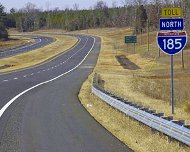Link to article here.
Big Bend is the target for one of Rick Perry’s planned Trans Texas Corridor routes, called La Entrada de Pacifico. So it shouldn’t surprise us that the idea of turning one of Texas’ natural treasures over to international control is being floated anew. Connect the dots…
Should Big Bend Become an ‘International Park?’
US Interior Secretary proposed the idea today, proposal dates back to the 1930s


 The first public-private partnership toll road established as a not-for-profit corporation has gone bust. The Connector 2000 Association, which operates a sixteen-mile, four-lane toll road linking Interstates 85 and 385 in southern Greenville County, South Carolina, announced last week that it was in default on its financial obligations.
The first public-private partnership toll road established as a not-for-profit corporation has gone bust. The Connector 2000 Association, which operates a sixteen-mile, four-lane toll road linking Interstates 85 and 385 in southern Greenville County, South Carolina, announced last week that it was in default on its financial obligations.